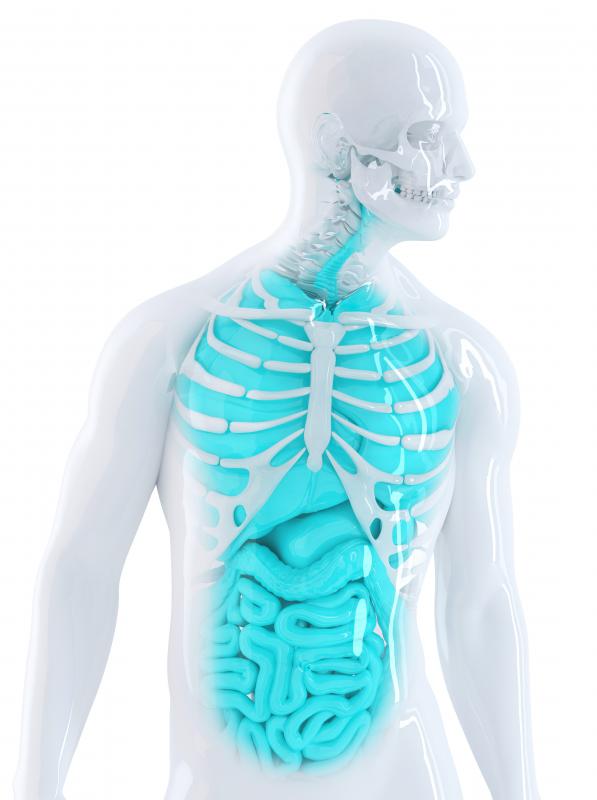At TheHealthBoard, we're committed to delivering accurate, trustworthy information. Our expert-authored content is rigorously fact-checked and sourced from credible authorities. Discover how we uphold the highest standards in providing you with reliable knowledge.
What are the Symptoms of Large Intestine Cancer?
Large intestine cancer is a very common and potentially fatal malignancy. The condition often goes undiagnosed for several years since it does not typically cause symptoms in the early stages. When symptoms do arise, they may include abdominal pain, bloody stools, and weight loss. An untreated case can lead to chronic fatigue, frequent illness, and severe gastrointestinal problems. Any unusual changes in bowel movements or other possible symptoms should be reported to a doctor immediately so the proper screening tests can be performed.
Early stage large intestine cancer is typically isolated on the inner lining of the colon. The size and number of cancerous cells are generally too small to cause irritation or obstructions in the bowels. Some people begin experiencing early symptoms of pain in their lower abdomens and changes in the consistency of their stools in the earliest stage, but most individuals do not have any noticeable problems. Symptoms are more likely to arise as cancer spreads deeper within the lining and muscle tissue.

Small tumors in the large intestine can cause worsening abdominal pain, cramps, bloating, and gas. Stools may be bloody and narrower than usual if the colon is obstructed. Many people have frequent episodes of diarrhea and constipation that do not seem to respond to over-the-counter medications and home remedies.
As large intestine cancer progresses, a person may feel fatigued most of the time and begin losing weight. The lower abdomen may be tender to the touch, and bowel movements can be painful. Cancer that spreads to the lymph nodes and other places in the body can cause symptoms of anemia, such as dizziness, headaches, shortness of breath, and severe fatigue. Health problems continue to worsen if medical care is not sought.

When a doctor suspects large intestine cancer, he or she can perform a series of diagnostic tests. Blood samples are analyzed to detect anemia and screen for other possible causes of symptoms, such as infections and autoimmune disorders. X-rays, computerized tomography scans, and colonoscopies are usually performed to carefully inspect the colon. If a tumor or abnormality is discovered, a biopsy can be performed to confirm the presence of cancer.

Surgery to remove part or all of the large intestine is effective at curing most cases of early stage cancer. If malignant cells have already spread, however, chemotherapy and radiation treatments may also be necessary. Late-stage large intestine cancer is often fatal despite aggressive cancer treatments. Doctors strongly urge people who experience symptoms or who are over the age of 50 to receive cancer screenings in hopes of detecting problems early.
AS FEATURED ON:
AS FEATURED ON:


















Discussion Comments
After the surgery, my uncle lived a normal life for about a year before he got sick again. Everyone was so sad and disappointed. The disease had spread. The one thing I will always remember is how grateful my uncle was that he had that last year and a half after his surgery.
I'm not a doctor, so I don't know the specifics of cancer development, but I have done some research on cancer cells. I find it fascinating that cancer starts as a simple mistake in the creating of cells in the human body.
Abnormal cells are created within the body and then the cells begin to grow and divide, forming polyps that can eventually turn into cancer. As the article stated, a person can have these abnormal cells long before colon cancer becomes deadly, and long before any colon pain is felt.
To me, this means we have a good window of opportunity to fight the disease before it develops, and in its early stages once it does develop.
As the article said, cancer of the large intestine is common and it is all too often deadly. In the future, we will learn more about the disease and begin to make headway into curbing the damage the disease causes. Until then, because this cancer is so dangerous, everyone should take precautions.
The main step a person should take is to be screened for colon cancer. Polyps detected early can be removed before they ever have a chance to develop into cancer.
Post your comments